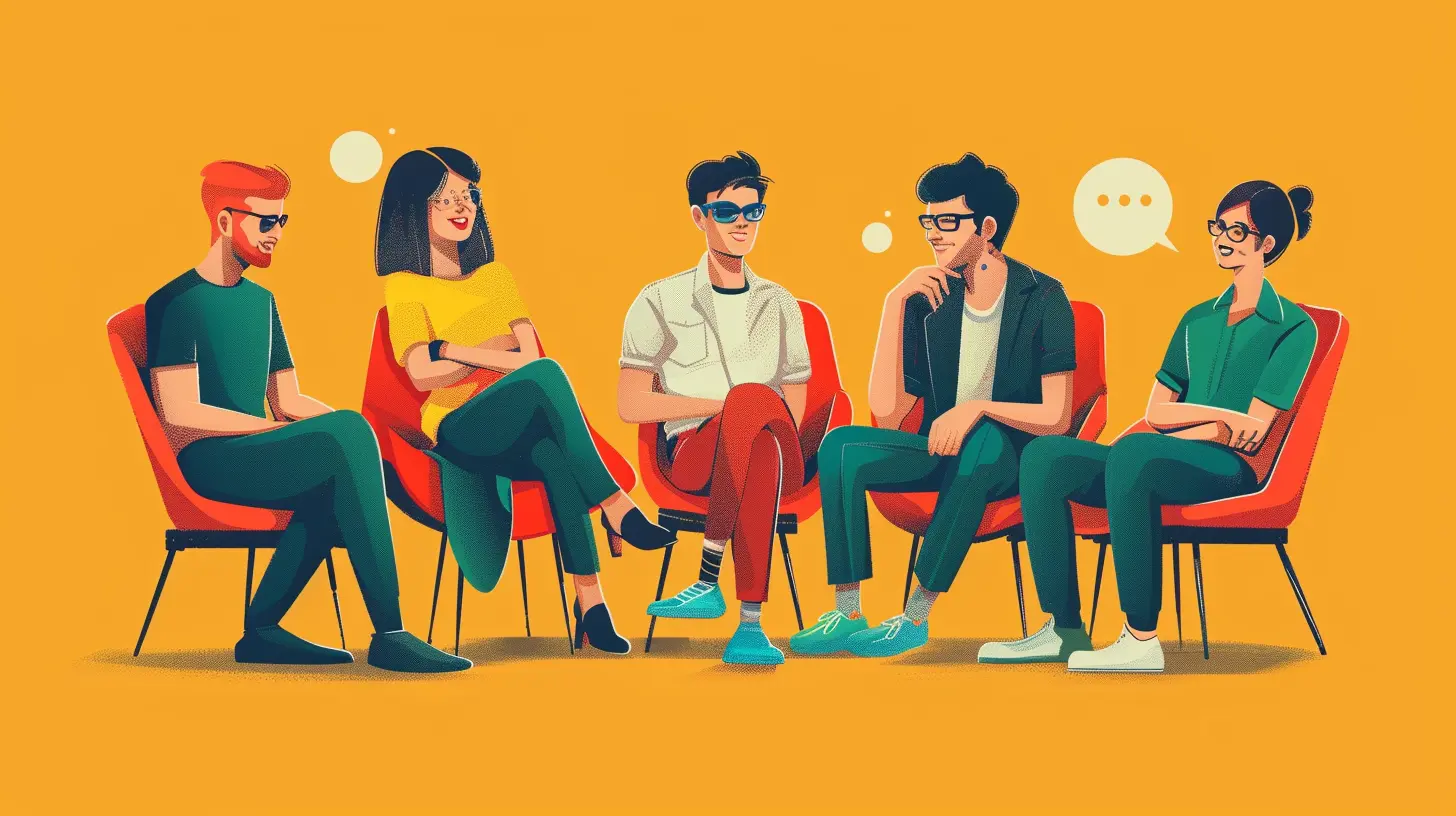Social Loafing: Why People Work Less in Groups
27 August 2025
Ever been stuck in a group project where half the team disappears into the Bermuda Triangle the moment the workload gets real? Yeah, we've all been there. Whether it's a college assignment, a corporate team meeting, or organizing your cousin's wedding — the dreaded “group effort” often turns into a one-man (or woman) show. Welcome to the weird and somewhat irritating world of social loafing.
Let’s dive into why people mysteriously become productivity phantoms when they’re in a group setting. Get comfy — this is going to be quirky, relatable, and strangely enlightening.
🎭 What the Heck Is Social Loafing?
Alright, let’s break it down. Social loafing is a psychological phenomenon where people tend to put in less effort when working in a group than when working alone.Imagine tug-of-war. In theory, if you’ve got five people pulling together, they should be five times stronger than one person alone, right? Wrong. Studies show that the more people you add to the team, the less effort each person contributes. Somewhere along the rope, motivation gets tangled and quietly slips away.
The term was coined in the 1970s by social psychologist Bibb Latané (a name that sounds like he should be mixing fancy coffee drinks but was actually dropping psychological truth bombs). He noticed that people slacked off in group tasks, assuming others would pick up the slack. And thus, social loafing strutted onto the psychological stage.
🧪 The Classic Rope-Pulling Study (Yes, It’s a Thing)
Let’s time travel to 1913 (yes, over a century ago) when a French agricultural engineer named Max Ringelmann ran an experiment. He had folks pull a rope — first alone, then in groups. Shockingly, people didn’t pull harder in a group. They actually pulled less.Fast-forward to the modern world, and this experiment has been replicated with everything from shouting in a room to brainstorming sessions. The results? Consistently loaf-y.
🤔 Wait, Why Do People Do This?
The mystery of social loafing has puzzled psychologists for decades. Here’s what’s going on in our heads when we decide to take a mental siesta during group work:1. Diffusion of Responsibility
The classic “someone else will do it” syndrome. In a group, responsibility gets watered down. We assume others are giving it their all, so we don’t have to. It’s like being in a buffet line — if enough people bring plates, maybe you don’t need to.2. Lack of Accountability
If no one’s tracking individual contributions, it’s way easier to coast. No one calls you out, no guilt, no stress. Just smooth-sailing on the Lazy River of group dynamics.3. Perceived Inequity
“Oh great, I’m doing all the work while Tim from accounting scrolls memes.” If you feel like others aren’t pulling their weight, you might subconsciously (or very consciously) reduce your own effort. Fairness matters, folks.4. Low Motivation or Interest
If the task is boring or doesn’t feel meaningful, people naturally disengage. Group settings can magnify this, especially if you think your unique skills aren’t essential.
🧠 Who’s More Likely to Loaf?
Spoiler alert: not everyone becomes a group ghost. Some folks are naturally more prone to social loafing than others.- Introverts might shrink back, not because they don’t care, but because they’re not comfortable in group chaos.
- Low conscientiousness individuals (that’s psych-talk for folks who aren’t super organized or disciplined) might slack off more often.
- People in larger groups tend to contribute less than those in small, tight-knit teams.
And yes, some people just don’t care. (Looking at you, Chad.)
🧐 Is Social Loafing Always a Bad Thing?
Not necessarily! Weirdly enough, there are moments when loafing might kind of make sense. For example, in huge organizations where micro-output from each individual isn’t make-or-break, a little loafing might help prevent burnout. It’s the human psyche saying, “Hey, let's not sprint a marathon.”That said, habitual loafing can tank team performance, tank morale, and eventually tank your reputation. Not ideal.
🛑 Social Loafing Vs. Free Riding
These two often get lumped together, but they’re slightly different beasts.- Social Loafing: Unconscious slacking due to group dynamics.
- Free Riding: Fully conscious decision to do nothing and mooch off the group. (Yeah, we all know a couple of professional free riders.)
So while social loafers might not intend to slack off, free riders are all about that zero-effort lifestyle.
💡 How to Stop the Loaf (and Save the Bread)
If you've got a team of loafers on your hands, don’t panic. There are ways to bring back motivation and accountability without turning into a micromanaging dictator.1. Make Individual Contributions Visible
When everyone knows their work is being tracked — even just informally — they tend to step up. Share progress updates in meetings, or use tools like Trello or Asana. Out of the shadows, into the spotlight!2. Keep Teams Small
The smaller the group, the harder it is for people to disappear. In tiny teams, every contribution counts, and freeloading becomes awkwardly noticeable.3. Assign Specific Roles
Don’t just say, “Let’s all tackle this together!” That’s groupwork doom code. Instead, split up the project. Give everyone a role with clear deliverables — even if it’s something like “official snack coordinator.”4. Encourage Peer Evaluation
A little peer pressure (the healthy kind) goes a long way. Knowing that teammates will be rating your contribution makes people think twice before ghosting the project.5. Build Team Cohesion
The closer your team feels emotionally, the less likely they are to flake. When people care about each other, they’re more motivated to carry their weight. So schedule that team lunch or awkward icebreaker — it might save your productivity.📦 Real-World Loafing: From Office to Olympics
This isn’t just a classroom thing. Social loafing plays out in offices, sports teams, volunteer organizations, and yes — even among Olympic athletes. Teams that communicate well and trust each other tend to loaf less. Meanwhile, disorganized groups often suffer from an epidemic of “not my problem” syndrome.Even in social media activism or online collaborations, if responsibility isn’t clearly outlined, you get a sea of “likes” but very little actual effort. (Can I get a passive engagement?)
😎 Fun Fact: Social Loafing Isn’t Universal
Plot twist — social loafing isn’t equally strong in all cultures. In more collectivist societies (think Japan or China), people are often taught to prioritize group success over personal gain, which actually lowers the loafing effect. In more individualist cultures (like the U.S. or Australia), personal goals tend to come first, so group motivation can take a back seat.Yet another reason why understanding cultural context is essential in team dynamics.
🧙♂️ Can You Make Social Loafing Work for You?
Here's a quirky idea: what if you could harness the psychology of social loafing in reverse?Let’s say you’re working with a group, and you know people tend to slack when they don’t feel needed. Flip the script. Give people a sense of ownership. Make them feel like the project’s fate rests on their shoulders. Get them emotionally invested — like it’s their precious pet goldfish that needs feeding.
When people feel vital, they don't loaf — they lead.
📈 Social Loafing in the Age of Remote Work
Ah yes, the era of Zoom fatigue and Slack overload. Virtual teams bring unique challenges. It's way easier to vanish from a digital workspace than a physical one. So how do we tackle loafing when you can literally mute and ghost in seconds?Simple: increase check-ins, clarify expectations, and use tech to your advantage. Track tasks, celebrate wins, and — here's a radical idea — actually talk to your team members. (Crazy, right?)
The goal isn’t to breathe down anyone’s neck but to create a space where people feel seen, heard, and... y’know, like their work matters.
💬 Final Thoughts: Less Loaf, More Loaf-erformance
Social loafing is real, quirky, and kind of the psychological equivalent of ordering group nachos and then hiding your plate when the bill comes. But understanding why it happens gives you power. Next time you’re working on a group project — whether it’s for school, work, or a local bake sale — think about how you can un-loaf your teammates.Because when everyone brings their full loaf to the table, that’s when the magic happens.
all images in this post were generated using AI tools
Category:
Social PsychologyAuthor:

Gloria McVicar
Discussion
rate this article
1 comments
Holden Oliver
Interesting insight! It’s fascinating how group dynamics impact individual motivation—I'd love to explore solutions for overcoming this.
September 20, 2025 at 3:05 PM

Gloria McVicar
Thank you! I'm glad you found it interesting. Exploring solutions to enhance individual motivation in group settings is indeed crucial. Let's continue the conversation!


